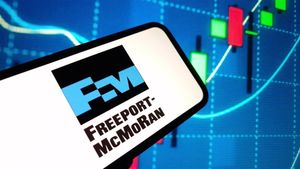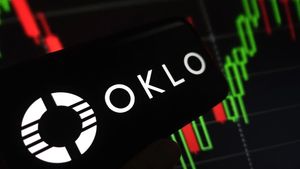
The period spanning late 2024 through the third quarter of 2025 has seen some of the world's most influential industrial and technology giants—Boeing, Intel, and Mercedes-Benz Group AG—grappling with a complex interplay of internal challenges, strategic shifts, and evolving market dynamics. From aerospace production woes and semiconductor restructuring to a re-evaluation of electric vehicle ambitions, these companies have been significant stock movers, reflecting broader industry trends and investor sentiment in a volatile global economy.
The financial markets have closely watched as these behemoths announced earnings, unveiled strategic pivots, and confronted regulatory hurdles. While diverse in their core businesses, their recent trajectories highlight common pressures, including persistent supply chain disruptions, inflationary pressures, geopolitical tensions, and the transformative yet sometimes unpredictable impact of AI and electrification. Their responses to these challenges offer a microcosm of the larger economic narrative unfolding on the global stage.
A Deep Dive into Recent Market-Moving Events
The past year has been particularly eventful for these industry leaders, with each company reporting significant developments that have reverberated through their respective sectors.
Boeing's (NYSE: BA) Flight Through Turbulence: The aerospace giant continued its struggle to stabilize production and address lingering quality control issues. Its Q1 2025 earnings, reported on April 23, 2025, showed revenue climbing to $19.5 billion on the back of 130 commercial deliveries, yet the company posted a GAAP loss per share of ($0.16) and a core loss per share of ($0.49). Production of the 737 program saw gradual increases, targeting 38 units per month, while the 787 program stabilized at five per month with plans to reach seven. A significant highlight was the expanded FAA certification flight testing for the 777X program, with the first 777-9 delivery anticipated in 2026. However, Q2 2025 earnings, reported on July 29, 2025, revealed a revenue increase to $22.75 billion from 150 commercial deliveries, surpassing estimates, but a wider GAAP loss per share of ($0.92) and a core loss per share of ($1.24), missing consensus. Regulatory issues continued to plague the company, with certification for the 737 MAX 7 and 10 models delayed to 2026 due to engine anti-ice design flaws. Furthermore, a $445 million earnings charge was recorded in Q2 2025 related to a non-prosecution agreement with the U.S. Department of Justice. Despite these setbacks, Boeing's Defense, Space & Security segment secured a substantial $2.8 billion Space Force contract, and the company's total backlog grew to $619 billion, including over 5,900 commercial airplanes, bolstered by a significant jetliner order from Uzbekistan in September 2025 and potential larger agreements with China.
Intel's (NASDAQ: INTC) Foundry Bet and Restructuring: The semiconductor titan embarked on a period of aggressive strategic restructuring and substantial investments in its foundry business, aiming to regain its technological edge. Intel's Q2 2025 earnings, reported on July 24, 2025, showed revenue of $12.86 billion, exceeding expectations. Despite this, the company posted a wider GAAP net loss of $2.9 billion, an 81% year-over-year decline in profitability, largely attributed to a $1.9 billion restructuring charge from workforce reductions and operational shifts. Non-GAAP EPS was ($0.10), and gross margin declined to 27.5% (GAAP). Intel announced plans to reduce its workforce by approximately 15%, targeting around 75,000 employees by year-end. A critical component of its strategy is the Intel Foundry, which in September 2024 expanded its collaboration with Amazon Web Services (AWS) to co-invest in custom chip designs, including an AI fabric chip on Intel 18A and a custom Xeon 6 chip on Intel 3. Additionally, Intel secured up to $3 billion in direct funding under the CHIPS and Science Act for the U.S. government's Secure Enclave program. Strategic partnerships and funding were also key, with a $2 billion equity investment from Softbank, a reported 10% U.S. government stake through equity and grants, and a "blockbuster deal" to co-develop chips with NVIDIA, including a $5 billion investment from NVIDIA. Intel is also preparing for the launch of its Panther Lake processors in late 2025.
Mercedes-Benz Group AG's (FWB: MBG) EV Recalibration: Formerly Daimler, Mercedes-Benz Group AG faced significant challenges in its electric vehicle (EV) transition strategy, leading to a notable dip in profitability. In February 2024, Mercedes-Benz revised its ambitious "all-electric" strategy, acknowledging that the pace of EV adoption would be market- and customer-driven. The company announced it would maintain flexibility, continuing to offer internal combustion engine (ICE) vehicles well into the 2030s. This involved halving its EV sales targets, now aiming for EVs and hybrids to account for up to 50% of sales by 2030, a target initially set for 2025. This strategic shift, combined with a $3.3 billion share buyback program, saw its stock price increase by 5.9%. Financially, late 2024 and early 2025 proved challenging. In September 2024, Mercedes-Benz lowered its full-year 2024 earnings forecast, reducing its operating profit margin outlook for Mercedes-Benz Cars from 10-11% to 7.5-8.5%. The company reported a 23.1% drop in BEV sales in 2024 compared to 2023, and the group's net profit fell by 28.4%. Q2 2025 earnings, reported between July 30 and August 1, 2025, highlighted a substantial decline in profitability: revenue was €33.2 billion, a 10% decrease year-over-year; EBIT plummeted 68% to €1.27 billion; and EPS dropped 68% to €0.95. The company attributed this to headwinds from tariffs on U.S. imports and challenging market conditions in China. Despite the profit decline, industrial free cash flow remained robust at €1.9 billion. Mercedes-Benz plans to launch the Mercedes-AMG PureSpeed, the first in its "Mythos" ultra-luxury series, in 2025, and is strengthening its battery supply system with high-silicon anodes and solid-state batteries.
Winners, Losers, and Market Repercussions
These developments have created a distinct landscape of potential winners and losers, with significant implications for each company's competitive standing and future trajectory.
Boeing's ongoing production challenges and regulatory scrutiny have undoubtedly positioned it as a company under pressure. While its substantial backlog indicates strong underlying demand, delays in certification for new MAX models and quality control issues risk eroding customer trust and market share in the long term. Competitors like Airbus (EPA: AIR) stand to gain from Boeing's production struggles, potentially capturing more orders or accelerating their own delivery schedules. However, Boeing's strong performance in its Defense, Space & Security segment and strategic orders, particularly from emerging markets like Uzbekistan and potentially China, suggest a diversified revenue stream that could cushion some of the commercial aircraft division's headwinds. The company's ability to successfully ramp up 737 and 787 production and bring the 777X to market on its revised timeline will be crucial for its stock performance.
Intel's aggressive pivot into the foundry business, coupled with significant government and private investments, positions it as a potential long-term winner in the resurgent domestic semiconductor manufacturing landscape. The substantial funding under the CHIPS and Science Act and partnerships with AWS and NVIDIA underscore a concerted effort to regain technological leadership and diversify its revenue streams beyond its traditional CPU business. However, the immediate impact includes substantial restructuring charges and workforce reductions, contributing to wider GAAP net losses in the short term. This period of transition makes Intel a high-risk, high-reward proposition. Existing foundry leaders like Taiwan Semiconductor Manufacturing Company (NYSE: TSM) and Samsung Electronics (KRX: 005930) will face increased competition from a revitalized Intel, while other chip designers stand to benefit from Intel Foundry's expanded capabilities.
Mercedes-Benz Group AG's recalibration of its EV strategy reflects a pragmatic response to slower-than-anticipated EV adoption rates in certain markets. While initially perceived as a step back from ambitious electrification goals, this flexibility could allow the company to better meet diverse customer demands, including continued strong demand for ICE and hybrid vehicles. This strategic pivot, alongside a share buyback program, initially boosted its stock, suggesting investor approval for a more balanced approach. However, the significant dip in profitability in Q2 2025, driven by tariffs and challenging Chinese market conditions, highlights the immediate financial pressures. Companies more aggressively committed to full electrification, such as Tesla (NASDAQ: TSLA) or BYD (HKG: 1211), might continue to capture market share in the pure-EV segment, but Mercedes-Benz's luxury appeal and diversified powertrain offerings could provide resilience. The company's focus on ultra-luxury models like the Mercedes-AMG PureSpeed and advancements in battery technology demonstrate an effort to maintain its premium market position.
Broader Market and Industry Implications
The recent events surrounding Boeing, Intel, and Mercedes-Benz Group AG are not isolated incidents but rather symptomatic of broader, interconnected trends shaping global industries and financial markets.
Supply Chain Fragility and Inflationary Pressures remain a persistent challenge across all three sectors. Aerospace continues to grapple with labor shortages and parts availability, impacting Boeing's production ramp-up. The automotive industry faces ongoing microchip shortages, though less severe than in previous years, while rising input costs broadly affect manufacturing. While overall inflation is projected to cool, service inflation remains a concern, impacting operational expenses. These factors underscore the need for resilient supply chain strategies and efficient cost management.
Geopolitical Tensions and Trade Policies are increasingly influencing global trade, investment, and profitability. Mercedes-Benz's reduced forecasts due to new EU-U.S. tariffs on car exports to the U.S. market serve as a stark reminder of how policy shifts can directly impact corporate earnings. Similarly, Boeing's potential for larger aircraft agreements with China highlights the delicate balance of international trade relations in high-value industries. These tensions introduce uncertainty and necessitate agile strategic responses from global corporations.
The Accelerating Role of AI and Digitalization is a common thread driving innovation and investment. In semiconductors, AI and cloud computing are massive growth drivers, with generative AI chips alone projected to exceed $150 billion in value in 2025, fueling Intel's foundry investments. Aerospace is leveraging AI for aftermarket services and supply chain optimization, transforming engine maintenance. In automotive, AI is being integrated into advanced driver-assistance systems, autonomous driving, and even marketing, signaling a shift towards software-defined vehicles. This pervasive adoption of AI represents both a significant opportunity for efficiency and new product development and a substantial investment requirement.
The Evolving Pace of Sustainability and Electrification presents a nuanced picture. While the long-term trajectory towards EVs is undeniable, Mercedes-Benz's recalibration demonstrates that the speed of adoption is not uniform across all markets or customer segments. The renewed popularity of hybrid vehicles suggests a more gradual transition than initially anticipated by some automakers. In aerospace, the focus is on hybrid-electric propulsion systems and green aviation initiatives, indicating a parallel but distinct path towards sustainability.
The Road Ahead: Navigating Future Scenarios
Looking forward, the short-term and long-term possibilities for Boeing, Intel, and Mercedes-Benz Group AG will be shaped by their ability to execute current strategies and adapt to emergent market conditions.
For Boeing, the immediate future hinges on successfully resolving its production and quality control issues, which are critical for restoring customer confidence and meeting delivery commitments. The successful certification and delivery of the 777X in 2026 will be a key milestone. Long-term, increased defense spending and potential large orders from developing markets could provide stability. However, the company must also navigate intense competition from Airbus and manage its relationship with regulators. Strategic pivots might include further vertical integration to control critical component supply or enhanced digital manufacturing processes to improve quality.
Intel's trajectory will be defined by the success of its foundry business. The launch of Panther Lake processors in late 2025 will test its advanced node technology. The company must demonstrate that its significant investments in manufacturing capacity and R&D can translate into competitive products and profitable market share gains against rivals like TSMC and Samsung. Strategic adaptations could involve further expanding its ecosystem of partners and aggressively pursuing niche markets for custom AI chips. The market opportunities lie in the booming AI and data center segments, but challenges include the immense capital expenditure required and the intense competition for talent and technological leadership.
Mercedes-Benz Group AG will need to carefully balance its revised EV strategy with continued investment in ICE and hybrid technologies. The launch of the Mercedes-AMG PureSpeed and advancements in battery technology underscore its commitment to luxury and innovation. Short-term, managing the impact of tariffs and navigating challenging market conditions in China will be critical for profitability. Long-term, the company must ensure its flexible powertrain strategy allows it to maintain market leadership in premium segments, regardless of the pace of EV adoption. Strategic pivots could include further emphasizing software-defined vehicles and leveraging AI for personalized customer experiences.
Concluding Thoughts: A Market in Transition
The recent performances of Boeing, Intel, and Mercedes-Benz Group AG underscore a period of profound transition across major industrial sectors. Each company, despite its distinct challenges, reflects broader themes of supply chain fragility, geopolitical influence, technological disruption, and evolving sustainability mandates.
For investors, the key takeaway is the increasing importance of resilience, adaptability, and strategic foresight. Boeing's struggle highlights the critical nature of operational excellence and regulatory compliance in high-stakes industries. Intel's aggressive foundry bet signifies the capital-intensive and high-reward nature of the semiconductor race. Mercedes-Benz's EV recalibration demonstrates the necessity of pragmatic strategy in rapidly evolving consumer markets.
Moving forward, investors should closely watch for continued progress in Boeing's production stabilization and 777X certification. For Intel, the focus will be on the execution of its foundry roadmap, the profitability of its new chip designs, and the impact of its strategic partnerships. Mercedes-Benz's ability to navigate trade headwinds, manage its diversified powertrain strategy, and maintain its premium market position will be paramount. The interplay of these individual corporate narratives within the larger economic and technological shifts will continue to define market movements in the coming months.
This content is intended for informational purposes only and is not financial advice.





